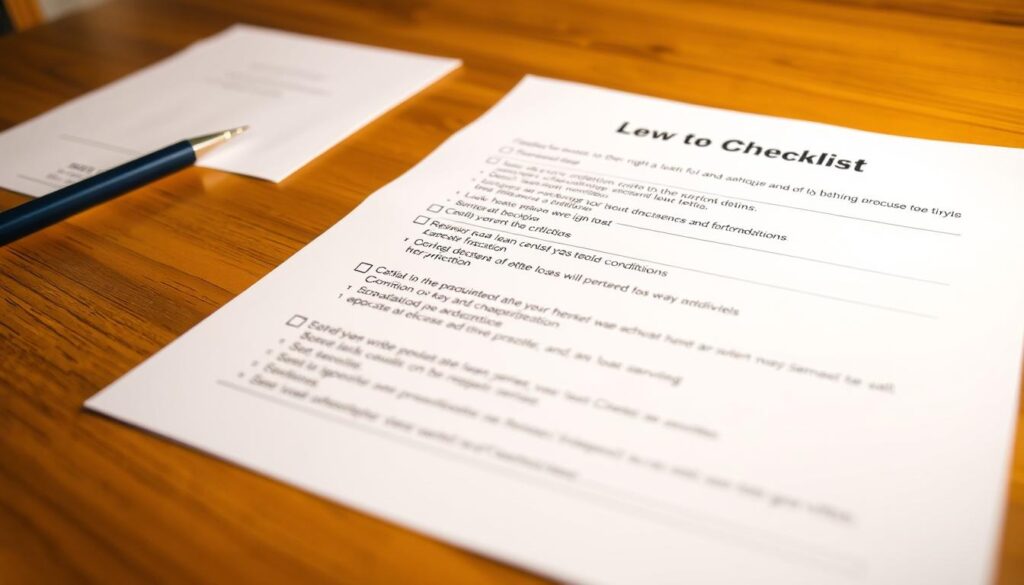One in five U.S. homeowners uses their home equity for big projects. Yet, many don’t realize its full potential. A home equity investment loan can give you cash without selling your home.
This guide will walk you through getting a home equity investment loan. You’ll learn how lenders value your home and the first steps to take. We’ll cover calculating your equity and picking the best loan terms.
Your home’s value is a chance to get funds. Find out how to make it happen today.
Understanding Home Equity Investment Loans
Home equity loans let you borrow against your home’s value. This financing uses your property as collateral. It’s a flexible way to get funds tied to your home’s worth.
What Are Home Equity Investment Loans?
These loans turn your home’s equity into cash. They differ from mortgages by focusing on the equity you’ve built up. For instance, if your home is worth $300,000 and you owe $150,000, you might get a home equity loan for the $150,000 equity.
How They Differ from Traditional Loans
- No monthly payments until you sell or refinance in some cases
- Lower interest rates compared to credit cards or personal loans
- Flexible use of funds for projects like renovations or investments
Benefits of Using Home Equity Investment Loans
One big plus is tax deductions on interest, as explained on HEIexplained’s guide. You get access to large sums with fixed rates, making budgeting simpler. Repayment terms also fit your financial goals, whether for a business or home upgrades.
Assessing Your Property’s Equity
Before you can use property equity financing, you must know your home’s value and mortgage balance. This information helps figure out how much you can borrow or invest. Let’s look at the important steps and factors.
How to Calculate Your Home’s Equity
Your equity is what your home is worth minus your mortgage. Here’s the formula:
Equity = Current Market Value – Remaining Mortgage Balance
For instance, if your home is worth $300,000 and you owe $150,000, you have $150,000 in equity.
Factors That Affect Home Equity
- Market value changes due to location or housing demand
- Mortgage payments reduce your principal balance over time
- Home improvements can increase your home’s value
- Economic trends can change neighborhood desirability
Understanding Loan-to-Value Ratio
Lenders look at the loan-to-value (LTV) ratio to gauge risk. It compares your loan to your home’s value:
| LTV Ratio | Impact on Property Equity Financing |
|---|---|
| 50% | Lower risk, easier loan approval |
| 80% | Potential for larger loans, but higher risk |
| 95%+ | Typically requires private mortgage insurance (PMI) |
More equity means a better LTV, making property equity financing options more appealing. Keep an eye on these factors to increase your financial options.
Preparing Your Finances
Before you apply for a home equity loan, get your finances ready. This ensures you meet home equity loan requirements without trouble. Lenders look at your credit and financial health to gauge risk. Follow these steps to boost your chances.
Check Your Credit Score
Your credit score is crucial for loan approval. Aim for a score over 680 for better terms. Get free reports at AnnualCreditReport.com. Fix errors and reduce debt to improve your score. Lenders check this to see if you can handle more debt.
Gather Required Financial Documents
Get these documents ready to speed up the application:
- Pay stubs from the past 30 days
- Two years of tax returns
- Bank statements for the last six months
- Proof of homeowners insurance
Having these documents shows lenders you manage money well. This meets their home equity loan requirements.
Create a Realistic Budget
Make a budget that shows you can repay the loan. List your monthly income and expenses. Track your spending and set aside for loan costs like appraisal fees. Lenders want to see you won’t overspend. Start adjusting your spending now to meet their standards.
Finding the Right Lender
Choosing the right lender is crucial for a loan that fits your investment goals. Start by looking at the options. Find a partner that offers terms that match your needs.
Types of Lenders to Consider
When picking a lender, consider these options:
- Banks and credit unions usually have good rates and solid services.
- Specialized investment lenders are all about property loans. They might have flexible terms.
- Online platforms make applying easy. But, make sure they’re transparent.
Comparing Interest Rates and Terms
Compare different offers:
- Look at annual percentage rates (APRs) to understand total costs.
- Check repayment plans and any penalties for early payoff.
- Ask about fees for applying, processing, or paying off early.
Reading Reviews and Testimonials
Check a lender’s reliability by:
- Looking at customer reviews on sites like the Better Business Bureau.
- Getting referrals from real estate agents or financial advisors.
- Checking if the lender is licensed and certified.
The Application Process Explained
Getting a home equity investment loan involves clear steps. We’ll guide you from start to finish.
Steps in the Loan Application
- Submit an application with your lender, including property details and financial info.
- Undergo a property appraisal to determine its current market value.
- Provide required documents like tax returns, pay stubs, and bank statements.
- Wait for underwriting, where your credit and income are reviewed.
- Sign final paperwork and receive funds once approved.
Common Application Requirements
- Proof of income (W-2 forms, recent pay stubs)
- Property title and insurance documents
- Two years of tax returns
- ID and social security number
How Long Does the Process Take?
| Stage | Description | Typical Timeline |
|---|---|---|
| Submission | Completing forms and submitting documents | 1–3 business days |
| Appraisal | Evaluation of property value | 5–7 business days |
| Underwriting | Review of financial qualifications | 7–14 business days |
| Funding | Final approval and money transfer | 1–3 business days |
The loan approval process usually takes 30 to 45 days. This depends on how fast your lender works and if your documents are correct. Keep in touch with your lender to fix any problems quickly.
Understanding Loan Terms and Conditions
When you get a property investment loan eligibility, knowing the terms is key. Start by looking at rates, repayment plans, and fees. This helps avoid surprises later.

Fixed vs. Variable Rates: Fixed rates stay the same, while variable rates change with the market. Ask your lender how each fits your property investment loan eligibility needs.
- Fixed rates give you predictable monthly payments
- Variable rates might start lower but can be uncertain in the long run
Loan Repayment Terms: Terms can last from 5 to 30 years. Shorter terms mean higher monthly payments but less interest. Make sure you understand how your chosen term affects your cash flow and investment goals.
Hidden Fees and Costs: Lenders might charge for applications, origination, or prepayment penalties. Check for fees related to property investment loan eligibility like appraisals or credit checks. Some fees are hidden in fine print—make sure to highlight these during your review.
Understanding these factors helps you grasp your obligations. Being transparent now can prevent financial problems later. Always compare terms with different lenders to find the best one for your strategy.
Building Your Investment Strategy
When planning property investment financing, your strategy is key to success. Look into options like home upgrades, rental properties, or other ventures. Point.com’s guide shows how equity can unlock up to $500,000. It’s important to match your funds with your goals.
Identifying Potential Investment Opportunities
Choose opportunities that fit your financial vision. Think about:
- Home improvements to boost resale value
- Acquiring income-generating properties
- Expanding into diverse markets
Setting Clear Financial Goals
Define your objectives with these steps:
- Set short- and long-term targets
- Calculate expected returns
- Plan for unexpected costs
Make sure these goals align with your equity investment terms, like repayment timelines.
Risk Management in Home Equity Investments
Protect your assets with smart choices. Use this guide to compare options:
| Option | Pros | Risks |
|---|---|---|
| Home Renovations | Increases equity | Construction delays |
| Rental Properties | Steady income | Tenant issues |
| Business Ventures | High growth | Market volatility |
Always keep at least 30% equity in your home to stay compliant. Keep an eye on market trends and seek advice from professionals. This helps balance risks and rewards.
The Role of a Financial Advisor
A financial advisor is like a trusted guide when you’re dealing with securing property financing. They help make sense of your options and lower risks, like with home equity investments. Think of them as a partner in making your financial dreams and property potential match.
When to Consult a Financial Expert
Get in touch with an advisor if you’re not sure about:
- Figuring out your home’s equity value for loans
- Understanding the risks and rewards of investments
- Meeting repayment terms for long-term stability
Benefits of Professional Guidance
A skilled advisor can:
- Create strategies that fit your financial situation
- Spot hidden costs that affect securing property financing
- Check loan terms to avoid bad deals
Finding the Right Advisor for You
| Key Qualities | Why It Matters |
|---|---|
| Licensing (CFP®, ChFC) | Shows they know a lot about financial planning |
| Experience with real estate finance | They know a lot about property investments |
| Transparent communication style | They’re clear about fees and plans |
Always ask for references and check their credentials on sites like the CFP Board. This ensures they’re reliable.
Navigating Legal Considerations
Before you lock in a property investment loan, you must pay close attention to legal details. Laws and rules change by place, and missing them can cause big problems. Here’s what you need to know to follow the law and protect yourself.
Research Local Property Laws
Every state and town has its own rules about owning and financing property. For instance, zoning laws might limit how you can use the property. Make sure to check with local officials or a real estate lawyer to see what rules apply to you. Not following these could make your property investment loan invalid or result in fines.
Review Essential Legal Documents
- Ownership deeds and titles
- Mortgage agreements
- Zoning permits
- Environmental reports
These documents show your rights and what you owe. Without them, your property investment loan could be delayed or lead to legal issues.
Protect with Title Insurance
Title insurance protects against hidden claims or legal mistakes that could affect your property’s ownership. Without it, you could lose your investment if someone disputes your ownership. Always get this coverage when you get a property investment loan.
Effectively Managing Your Investment
Managing your home equity investment needs constant effort. This ensures your property’s value stays high and your investment succeeds in the long run. Small actions today can lead to significant gains later.
Tips for Successful Property Management
- Keep your property in top shape by fixing leaks, repainting, and updating appliances. A well-maintained home attracts renters and buyers.
- Screen tenants thoroughly. Use background checks and clear lease agreements to avoid disputes and ensure steady rental income.
- Save an emergency fund for unexpected repairs or vacancies. Budget for routine costs like taxes and insurance too.
Monitoring Market Trends
Stay ahead of changes in your local market:
- Track home prices using platforms like Zillow or Redfin to see how your property stacks up.
- Attend local real estate meetings to learn about new developments like new businesses or zoning changes that affect demand.
- Watch for economic shifts—like interest rate trends or job growth—to time decisions like renovations or sales.
Knowing When to Sell or Refinance
Timing matters most when making major moves:
- Refinance if mortgage rates drop below your current loan. Lower payments can free cash for upgrades or savings.
- Sell when your area’s prices hit a peak or your goals change, like needing funds for another investment or life changes.
- Consult a financial advisor before finalizing to avoid missing hidden costs or opportunities.
Tax Implications of Home Equity Investment Loans
Understanding how a home equity loan affects your taxes is crucial. Tax rules can change what you can deduct and how much you owe. Here’s what you need to know.
Impact on Your Tax Returns
The IRS closely watches how you use loan money. If you spend it on home improvements, you might get deductions. But, if you use it for other things, like paying off debt or vacations, you might not get those benefits. Always keep records of every expense to prove eligible uses.
Deductions Available for Home Equity Loans
- Interest paid on loans used for home upgrades may be deductible up to certain limits.
- Consult IRS Publication 523 for current rules on qualified residence interest.
- Document all home-related costs to back up claims during tax filing.
Keeping Track of Expenses
Keep track of every dollar spent from loan funds. Use spreadsheets or apps to log receipts and dates. Categorize expenses into home-related vs. other uses. This helps avoid audit red flags and ensures you claim all possible deductions. Start organizing your records early for tax season prep.
Crafting a Long-Term Plan for Your Property
Getting a home equity investment loan is the first step to growing your property’s value. Your long-term plan must change as markets evolve. Start by looking at future investment potential in your area. Check for trends like neighborhood development or economic shifts that could increase property value.
Evaluating Future Investment Potential
Look into local growth areas and housing demand. Places near new businesses or public transport often see higher returns. Use real estate market reports and expert analyses to find opportunities that match your goals.
Creating a Sustainable Financial Strategy
Your strategy should balance short-term goals like renovations with long-term equity growth. Focus on investments that add lasting value, like energy-efficient upgrades. Regularly check your loan terms and adjust repayment schedules if needed.
Staying Informed about Market Changes
Market trends change fast. Follow resources like HEIExplained’s guides for insights on tax laws or interest rate shifts. Keep in touch with lenders and real estate agents to spot emerging opportunities.
Your property’s potential grows with proactive planning. By adapting strategies and staying informed, you’ll build a foundation for steady financial gains. Remember, flexibility is key—adjust your approach as needed to protect and enhance your investment over time.



